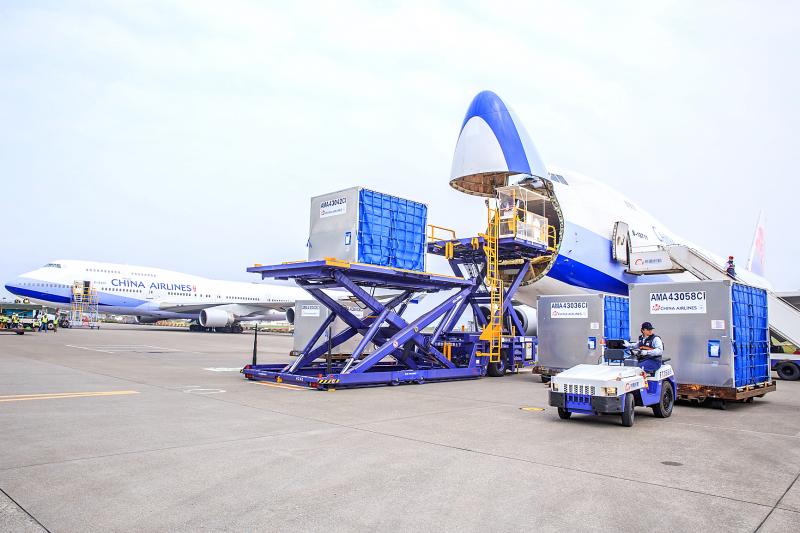China Airlines Ltd (CAL, 中華航空) yesterday announced the launch of a special cold chain logistics service to transport goods that need to be stored at minus-80°C in a bid to secure orders to ship COVID-19 vaccines.
The service uses using passive temperature-controlled containers, the airline said.
The airline has not received an assignment from the government, but the launch of the new service is expected to help the airline gain orders to transports vaccines to other countries, it said.

Photo courtesy of China Airlines Ltd
CAL in 2013 started a cold chain logistics service for medical supplies and materials, which can transport goods stored in a temperature range of minus-20°C and 25°C, suitable for most vaccines and drugs, it said.
CAL said it is the only Taiwanese carrier with Center of Excellence for Independent Validators certification from the International Air Transport Association.
“We have been approached by many forwarders that inquired our ability to transport the COVID-19 vaccines, and now we are negotiating with them,” CAL said in a statement.
CAL said its flying network includes first-tier cities in Europe and the US, which enables it to transport the vaccines to wherever the orders are placed.

South Korea’s equity benchmark yesterday crossed a new milestone just a month after surpassing the once-unthinkable 5,000 mark as surging global memory demand powers the country’s biggest chipmakers. The KOSPI advanced as much as 2.6 percent to a record 6,123, with Samsung Electronics Co and SK Hynix Inc each gaining more than 2 percent. With the benchmark now up 45 percent this year, South Korea’s stock market capitalization has also moved past France’s, following last month’s overtaking of Germany’s. Long overlooked by foreign funds, despite being undervalued, South Korean stocks have now emerged as clear winners in the global market. The so-called “artificial intelligence

‘SEISMIC SHIFT’: The researcher forecast there would be about 1.1 billion mobile shipments this year, down from 1.26 billion the prior year and erasing years of gains The global smartphone market is expected to contract 12.9 percent this year due to the unprecedented memorychip shortage, marking “a crisis like no other,” researcher International Data Corp (IDC) said. The new forecast, a dramatic revision down from earlier estimates, gives the latest accounting of the ongoing memory crunch that is affecting every corner of the electronics industry. The demand for advanced memory to power artificial intelligence (AI) tasks has drained global supply until well into next year and jeopardizes the business model of many smartphone makers. IDC forecast about 1.1 billion mobile shipments this year, down from 1.26 billion the prior

People stand in a Pokemon store in Tokyo on Thursday. One of the world highest-grossing franchises is celebrated its 30th anniversary yesterday.

Chinese artificial intelligence (AI) start-up DeepSeek’s (深度求索) latest AI model, set to be released as soon as next week, was trained on Nvidia Corp’s most advanced AI chip, the Blackwell, a senior official of US President Donald Trump’s administration said on Monday, in what could represent a violation of US export controls. The US believes DeepSeek will remove the technical indicators that might reveal its use of American AI chips, the official said, adding that the Blackwells are likely clustered at its data center in Inner Mongolia, an autonomous region of China. The person declined to say how the US government received